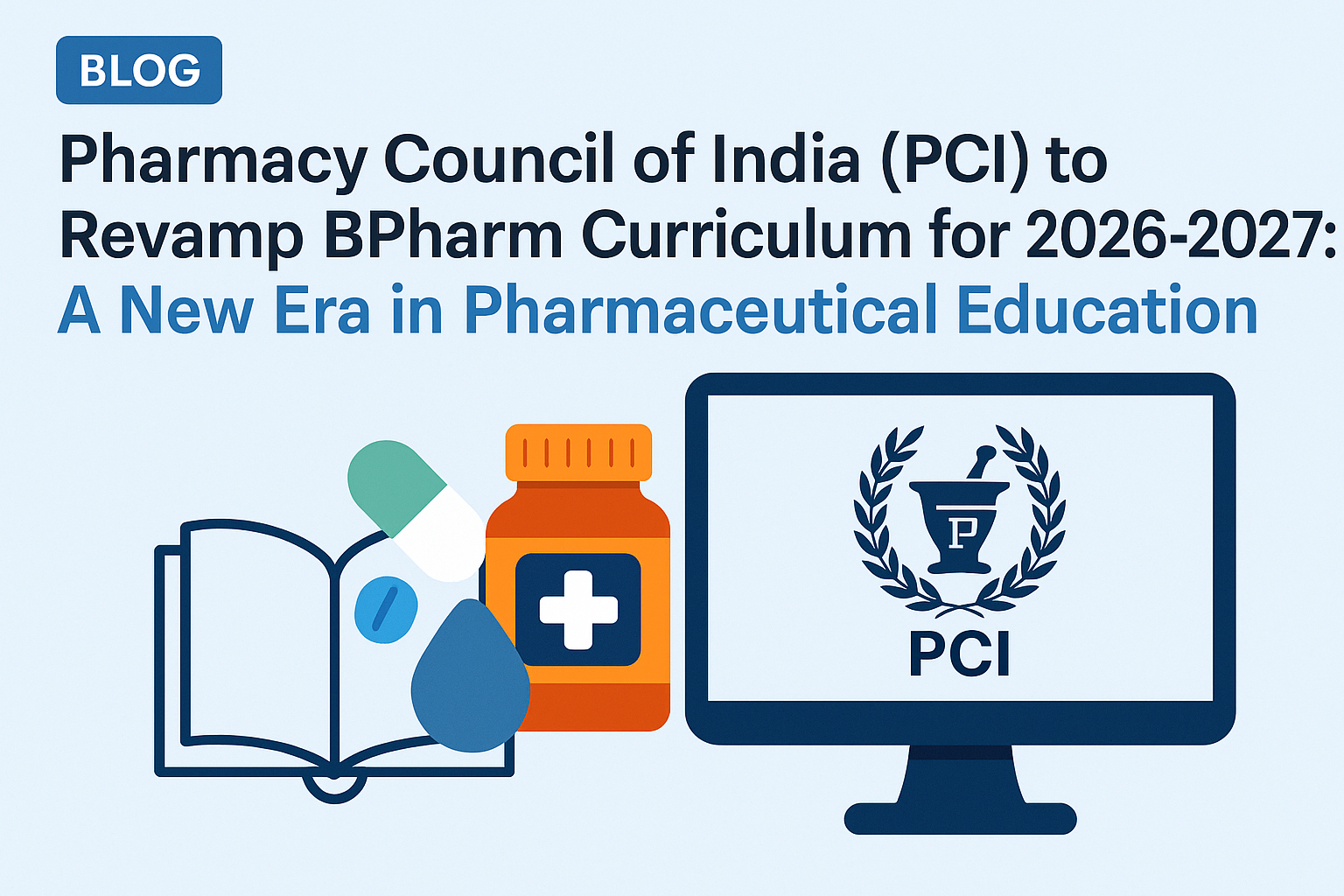- April 17, 2025
- Atal Tripathi
- 4:26 pm

After more than a decade, the Pharmacy Council of India (PCI) is all set to undertake a significant overhaul of the Bachelor of Pharmacy (B Pharm) curriculum to align it with the National Education Policy (NEP) 2020 and make it more industry-relevant. The upcoming revamp, which marks the first major curriculum update since 2014, is expected to be implemented from the 2026–2027 academic session. With a strong focus on producing industry-ready graduates, the revised curriculum is designed to bridge the gap between academic training and practical industry requirements.
In its new format, the B Pharm programme will be more specialised and flexible. For the first time, students will be offered a choice between two distinct specialisations—Industrial Pharmacy and Clinical Pharmacy—after completing the first two years of a common core syllabus. The initial four semesters will cover foundational subjects such as Pharmaceutical Chemistry, Pharmaceutics, Pharmacology, and Pharmacognosy. From the fifth semester onward, students will choose their path based on their interests and career goals.
The Industrial Pharmacy track will focus on preparing students for roles in the pharmaceutical manufacturing and research industries, covering advanced topics relevant to drug formulation, quality assurance, and regulatory affairs. On the other hand, the Clinical Pharmacy track will cater to the growing demand for pharmacists in healthcare settings, with emphasis on hospital-based pharmacy, patient counselling, and pharmacotherapeutics. This differentiation reflects the changing landscape of the pharmacy profession, especially in the post-pandemic world where pharmacists have played critical roles in community and hospital healthcare delivery.

According to Montukumar Patel, President of PCI, the restructured curriculum is also being designed with added flexibility in mind. Multiple entry and exit options will be introduced, allowing students to earn a diploma after two years if they choose not to complete the full programme. In addition, the revised curriculum will operate under a credit-based system, offering 170–172 credits in total. Students will also be allowed to take Massive Open Online Courses (MOOCs) via platforms like SWAYAM, and these online modules can be counted towards academic credit, further supporting the hybrid and flexible learning model proposed under NEP 2020.
To support this enhanced learning experience, students will be encouraged to choose elective courses from interdisciplinary fields. These electives will go beyond core pharmacy education, enabling students to explore subjects like biotechnology, artificial intelligence in healthcare, and business management, thereby improving their adaptability and employability. PCI aims to foster well-rounded professionals who not only understand pharmaceutical science but are also equipped with the technological and managerial skills needed in the modern world.
Another significant addition to the syllabus will be the incorporation of emerging technologies such as Artificial Intelligence (AI), machine learning, blockchain, and even robotic pharmacy. While AI has already made inroads into pharmaceutical research and industry processes, its formal inclusion in the curriculum represents a forward-looking approach by PCI. These innovations will ensure that B Pharm graduates are not only conversant with traditional pharmaceutical knowledge but also ready to tackle the demands of a rapidly evolving healthcare and pharmaceutical landscape.
Feedback from a wide range of stakeholders—including academic institutions, industry experts, and students—is being sought as part of the curriculum redesign process. A draft of the new syllabus will soon be made public for review and input, following which the final version will be published.
In parallel, PCI is also looking to revise the M Pharm curriculum, with plans to make it more research-oriented and aligned with future advancements in pharmaceutical sciences. The intention is to complete this process before the first batch of students under the new B Pharm curriculum graduates.
Recognising that curriculum reform must go hand-in-hand with faculty development, PCI has also initiated plans to train educators nationwide. Through dedicated training workshops, the council aims to familiarise teachers with the new syllabus, emerging technologies, and pedagogical strategies. A “train-the-trainers” model will be adopted, whereby senior faculty members will first receive training and subsequently disseminate knowledge within their respective institutions. The target is to train at least 500 teachers per month across India to ensure smooth implementation.
With this comprehensive revamp, PCI is laying the groundwork for a more dynamic, flexible, and future-ready pharmacy education system in India. By integrating specialisations, embracing technology, promoting interdisciplinary learning, and empowering educators, the new B Pharm curriculum promises to redefine the academic and professional landscape for pharmacy students across the country.
The Future of Pharmacy Education
Embracing Innovation in Pharmacy Education
Our curriculum is reimagined to meet the evolving needs of the pharmacy sector. With a focus on practical skills and real-world applications, we are committed to training future-ready professionals.
- Alignment with Industry Needs
- Integration of Emerging Technologies
- Interdisciplinary Approach
